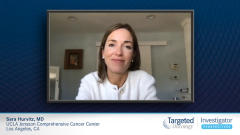
Safety and Efficacy of Amcenestrant in the AMEERA Trials
Sara Hurvitz, MD, reviews clinical trial data on amcenestrant, an orally administered endocrine therapy, in patients with ER+/HER2- breast cancer as shown in the AMEERA trials.
Sara Hurvitz, MD: Amcenestrant is a novel therapy that is similar in mechanism of action to that of fulvestrant. It is an estrogen receptor down regulator, and it has potent activity. In contrast to fulvestrant, which must be given by intramuscular injection monthly, 2 injections every month, amcenestrant is an oral SERD [selective estrogen receptor down-regulator]. It antagonizes and it degrades the estrogen receptor and inhibits the estrogen receptor signaling pathway potently. The dosing of amcenestrant currently being evaluated in large phase 3 clinical trials is 200 mg orally daily continuously without a break.
A multipart phase 1/2 first-in-human dose escalation trial has been conducted in women who are postmenopausal with hormone receptor-positive advanced breast cancer that’s been pretreated. This study known as AMEERA-1 is showing promising antitumor activity as well as encouraging safety data. Among those cohorts treated with monotherapy amcenestrant of doses of at least 150 mg daily, there were 5 partial responses out of a total of 59 patients, and there were 24 patients or 41% of patients who had stable disease.
The clinical benefit rate of the combination of amcenestrant at 200 mg daily plus palbociclib at 125 mg 3 weeks on, 1 week off in 35 patients who had response evaluable disease, who had not received a prior mTOR [mechanistic target of rapamycin] inhibitor or CDK4/6 [cyclin-dependent kinases 4 and 6] inhibitor, revealed an objective response rate of 34%, all of them were partial responses, and a clinical benefit rate of nearly 3/4. These data are quite encouraging. Also, there were no significant cardiac or ocular findings in either set of cohorts, either the monotherapy or in combination with palbociclib. And these data support the ongoing phase 3 evaluation of amcenestrant that are now accruing patients.
Transcript edited for clarity.









































